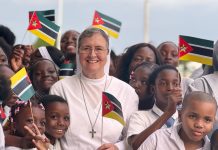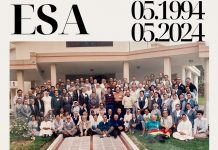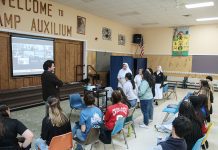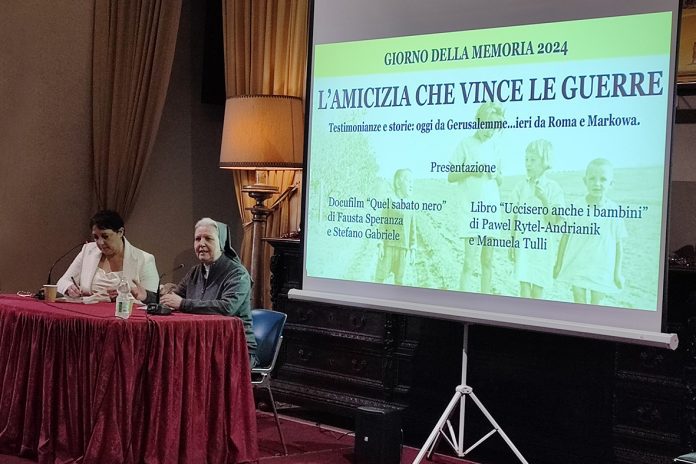Rome (Italy). On 27 January 2024, the International Holocaust Day of Memory is celebrated on the anniversary of the liberation of the Auschwitz extermination camp in Germany on the same day in 1945. The anniversary was established worldwide on 1 November 2005, by the United Nations, on the 60th anniversary of the end of the Second World War.
On 18 January 2024, a few days before the Day of Memory, in Rome in the Sala Baldini of the parish of Santa Maria in Portico in Campitelli, a few steps from what was the Jewish Ghetto, the meeting took place, “Friendship wins wars. Testimonies and stories: today from Jerusalem… yesterday from Rome and Markowa”. In the interweaving of stories between present and past, in filigree at the meeting there was the significant anniversary for Rome of the 80th anniversary of the rounding up of Jews in the Jewish Ghetto on 16 October 1943.
The moderator, Cristiana Caricato, Vaticanist of TV2000, recalling Israeli and Palestinian children torn from life and their childhood in the current conflict, stressed the importance of memory, “these stories tell us that remembering is a duty and that doing it is never enough,” and “perhaps the stories of friendship, but also of justice and beauty, are the ones that will save the world and that could save us today.”
Significant was also the location where the evening took place, recalled the pastor Father David Carbonaro. The Fathers of the Order of the Mother of God had hosted various Jews and, in that very room, a couple had given birth to a child, the sign of the victory of life over death.
Among the speakers, Sister Grazia Loparco, Daughter of Mary Help of Christians, Professor of Church History at the Pontifical Faculty of the Science of Education “Auxilium” in Rome, was called to bring the stories of welcome by religious institutes. At the foundation of her interest in these issues, she recalled the memorable meeting with Primo Levi, Holocaust survivor and author of If This is a Man, on the occasion of her thesis, which “changed her life” stating that “witnessing is a duty towards the younger generations” and leaving them an important teaching that “words have weight; we must use them well.”
Robert Leiber SJ, wrote in La Civiltà Cattolica (1961) that about 150 institutes, female, male, and some parishes had hidden 3,667 Jews for months and another 680 for less time, in total 4,447. The Vatican files, recently consulted, confirm the synergy between ‘organized’ assistance and ‘spontaneous’ assistance, the strategies, and the network of collaboration to help people emerge, as well as the welfare activity chaired by the Secretariat of State. Above all Montini, by the will of Pius XII, became the protagonist and filter in the management of requests in the name of charity.
“Since it was a page of history that was very oral with little written, because for many reasons of risk and fear, it was not written much in those months, says Sister Grazia, we felt the responsibility to go to look for these witnesses who could have direct memory, or direct us to the archives, to the documentation that could attest to these facts”.
In September 2023, news was released that an unpublished documentation that lists mostly Jewish persons who took shelter in Catholic institutions in Rome as they were fleeing the Nazi persecution has been rediscovered in the archive of the Pontifical Biblical Institute in Rome. The newly rediscovered lists refer to more than 4,300 persons, of whom 3,600 are identified by name. The documentation thus significantly increases the information on the history of the rescue of Jews in the context of the Catholic institutions of Rome. (cf. Vatican Press Office Release).
Sister Grazia is still engaged in research on the occasion of the 80th anniversary of the occupation of Rome, with many ‘pieces’ that emerge little by little, and is supported by the Faculty, which promotes collaboration at conferences and events to keep alive the memory, aimed at adults and young people.
“For me they are all important pieces, because every person’s story is unique.” As is the story of Marina Limentani, referring to the early hours of the emergency of 16 October, when her parents decided to turn to the FMA Institute where the sister of her grandmother, a religious was living:
“The Mother Superior received us in an exceptional way. She made us have breakfast, comforted us, and then we began to speak of what had happened. My parents said to her, ‘Sister, help us; we don’t know what to do. We have no money; we have nothing… She was so sorry for us and she said, ‘Look, what I can do is take the two little girls, the other daughter can be put in the Franciscan institute here in front… try to go and say that I sent you.’ So, we did and we three daughters were settled.” (Marina Limentani in Federica Barozzi, the Journey of survival. Saviors and saved during the Nazi occupation of Rome, 8 September 1943 – 4 June 1944, in Monthly Review of Israel 64, 1998/1, p. 129.)
What emerges from various testimonies is that many men and women religious, but also families and individuals, understood that refugees “were first and foremost persons. Being Jewish or not Jewish came later. This is very striking, because in those times there was already the journey of Jewish-Christian friendship, but perhaps it moved more on the level of theology, doctrinal dialogue. Instead, here we found common people, with the humanity that came from the faith, from the Gospel, from the fact of knowing that ‘you must love your neighbor if you say you love God’. This came first”.
An action of this kind involves the choice. “They could have refrained from risking so much if they had not sided on one side, which does not mean helping only some, because they helped everyone. Under the same roof there could be people with totally different ideas, but what prevailed was the dignity of the human person”. As Christians one could not remain indifferent or not take part.
Sr. Grazia continues, “These stories say how in the face of such a strong and unjust risk many Christians have been able to take a stand knowing, in the case of religious houses, that it did not only put one person at risk, but the whole community”. Recounting an episode that happened in a religious house of the attention of a sister to respect the conscience of a Jewish boy, making him only simulate kissing the crucifix so as not to draw attention to his diversity, she observed how “respect for others is the basis of friendship that in times when there is no longer an emergency, can establish the basis for an effective dialogue.”
In the same evening, in addition to the presentation of the ambassador Pasquale Ferrara, Director General of Political and Security Affairs of the Ministry of Foreign Affairs, the docufilm “That Black Saturday” was presented by Fausta Speranza and Stefano Gabriele, and the book “They also killed the children” by Manuela Tulli and Pawel Rytel-Andrianik, on the martyrdom of the Ulma family in Markowa, Poland, on 24 March 1944. (Video)
“May the remembrance and condemnation of that horrible extermination of millions of Jewish people and those of other faiths, which occurred in the first half of the last century, help us all not to forget that the logic of hatred and violence can never be justified, because they negate our very humanity” (Pope Francis, General Audience 24 January 2024)




















